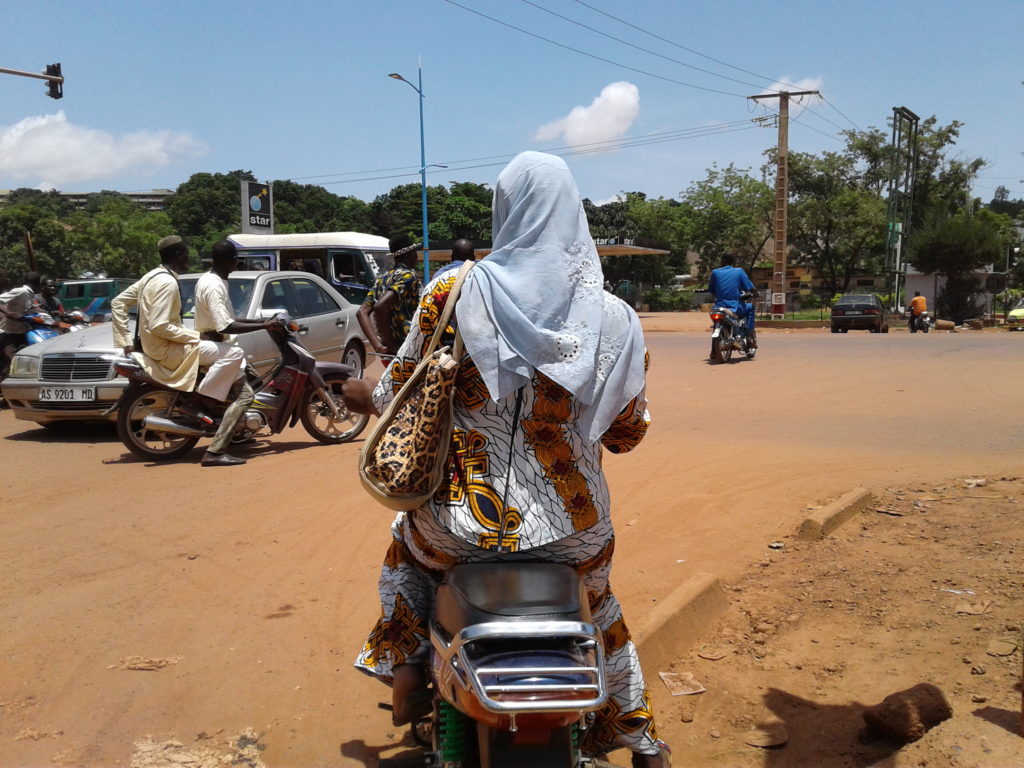I arrived at Bamako, capital of the modern country of Mali, in the late afternoon under a hot and yellow sky. Outside the small airport terminal, greeters waited for friends and family, hotel drivers held signs aloft, and touts—quietly and at a distance—offered local SIM cards or to change currency at the black market rate. One of the touts, his hair cut in the newfangled mohawk so fashionable among youths under thirty around the world, asked me in English if I needed a ride or a guide. I had expected my hotel to pick me up, but we at least spoke for a few minutes about his long-ago trip to Washington. He impressed me with a few words of Spanish that slipped into Italian, which was even more impressive. Than a police officer shooed all the non-passengers away from the shaded terminal entrance and back across the virtually carless roadway into the sun.
After a while, when I guessed that my driver wasn’t on the way, I tried to call the hotel from my cell phone, to no avail and saving me the nearly $5 per minute charge. I asked a uniformed woman passing by if she spoke English—“Pardon, parlez-vous anglais?” being one of the scant French phrases I’ve mastered—and, upon receiving an excited “Yes!,” asked if she could help me contact the hotel. She took me to the baggage office where she worked to contact them and wait for the driver. She told me about her two daughters who live in Atlanta and how she worked for Air Afrique in the ‘90s.
Staring out from the wall of her office was a French fashion model, plump red lips parted by white teeth that protruded as if the model, as a child, sucked her thumb. The face was framed by a tempest of hair, capped by a beret, and the Eiffel Tower rose in the distance over one thin shoulder. “France is in the air,” read the airline poster, advertising the single daily flight from Bamako to Paris. The wan, pouting body in the image appeared lifeless, ghostly compared with the vivid and corpulent bodies in my immediate vicinity. From the taxi on the way to the hotel, I saw an Air France billboard advertising “royal shopping in Paris.” Economically, Mali is one of the ten poorest countries in the world.
Entering the outskirts of the city, tangerine-colored dust, reminding me of Tallahassee or Pietermaritzburg, glowed in the sunlight, and I looked at the faces of the people walking alongside the road, riding on Chinese-made motorbikes, or selling sundries in the scant shade: Auntie Rosemary, Tyrone, Keisha’s little sister, Deacon Jones, Dr. McLendon.
We crossed the River Niger during the afternoon rush hour, and I noticed the abundance of motorbikes and the abundance—not the majority, but a notable number—of women astride and driving the motorbikes in brightly-colored floor-length dresses, traditional West African headwraps, and high heels. Other women wore hijabs or hoodies protecting Beyoncé-inspired braids—blonde, of course—from the citrusy dust. The men, whose second-hand clothing spoke more to the relative economic standing of the country than did the ladies’, wrenched out any bit of style they could muster, be it a cocked and reversed baseball cap, an elegant knee-length shirt with a fedora, chic plastic-rimmed spectacles, or one of the stylish haircuts appearing in Belgian hip-hop videos. Whatever they wore, they wore it well.
I arrived at a clean, mercifully air-conditioned hotel run by an Ivoirian Frenchman and his daughter, had an unimpressive dinner, then read until jetlag sent me to sleep.
The next morning, I had plans to go out into the city after breakfast to take photographs and meet up with the American friend of an American friend for coffee. But at breakfast, I ended up meeting a middle-aged white man who had been born in the Belgian Congo sixty-five years ago. He was ten when the war of independence broke out in the Congo and took a children’s-only train to safety in Cape Town, with no news of the whereabouts or well-being of his parents for a year. They showed up eventually, and he grew into manhood in South Africa, marrying a Coloured woman, illegally. They had two children and could never live in one place longer than three months at a time because, just as surely as they had moved into a house, a neighbor reported the interracial marriage to the police, who took about three months to act on the complaint. He told me how he helped smuggle contraband to anti-Apartheid resistance fighters and about the karate dojo in the Indian section of Johannesburg where he took his children for lessons and where people of all four racial groups bonded under the shared love of a martial art and the ability to not think about race for a while, anyway. Eventually, Apartheid ended, Mandela was released, and the first general election was held in 1994. Shortly thereafter, they moved to Belgium, where his marriage dissolved. He then, finally, accepted that he was gay.
We remained wrapped—and I, rapt—in conversation for the entire day. It was Mandela Day.
The next day, not having seen very much of Bamako at all, but determined to return again during the five-year duration of my visa, I went to the airport around lunchtime to check in to my onward flight to Dakar. The airport was virtually empty of passengers, and three immigration officers stood behind the glass partition sharing a heap of barbecued ribs wrapped in brown paper, just like they do at Jenkins’ Bar-B-Q back home, except the ribs were covered in onions rather than mustard-based barbecue sauce. We all laughed; they offered me some, but I had just eaten lunch and didn’t want to get my passport greasy. One of the officers used his ungreasy hand to process me out of the country and stamp my passport.
My people.
-Ernest White II

